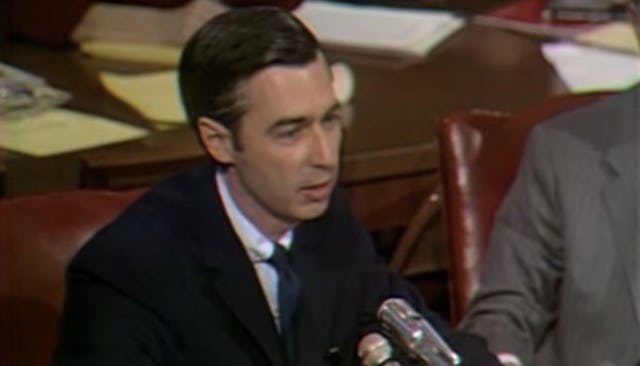Watch Mr. Rogers Convince Congress To Fund PBS And Try Not To Cry

In his gentle way, he tells the committee why PBS is so important
In 1969, a soft-spoken man with an affinity for cardigan sweaters went before the Senate Commerce Committee to defend the funding of PBS. In his speech about what publicly funded TV programs could offer, he gave a stirring testimony about the importance of quality programming for kids.
His name was Fred Rogers. And we need his wisdom now more than ever.
The White House recently released its plan to eliminate funding for a slew of things we cherish, including the Corporation for Public Broadcasting, which funds PBS. PBS is the purveyor of high-quality children’s television shows, and back in the day, one of those shows was “Mister Roger’s Neighborhood”.
Footage of Rogers passionately explaining to lawmakers why publicly funded television is so much different than privately funded programming has recirculated in the wake of the Trump administration’s budget plan being released.
Watch it and weep. We definitely did.
Trump’s proposed cuts to PBS are a somewhat eerie instance of history trying to repeat itself. Rogers was testifying before Congress to defend the existence of PBS because President Nixon was threatening to slash a $20 million grant headed its way.
He opened by imploring Senator John Pastore, who was in charge of the hearing, to read his philosophical statement on the importance of his show. Initially, Pastore was gruff toward Rogers and seemed impatient. That didn’t last long.
Rogers detailed what his show accomplishes. “We deal with such things as the inner drama of childhood. We don’t have to bop someone over the head to make drama. We deal with such things as getting a haircut. Or the feelings about brothers and sisters, and the kind of anger that arises in simple family situations. And we speak to it constructively.”
“We’ve got to have more of this neighborhood expression of care. This is what I give. I give an expression of care everyday to each child to help him to realize that he is unique,” he told the assembled lawmakers.
Rogers made a plea for the importance of teaching kids how to handle their feelings, and explained how his show did just that. “I feel that if we in public television can only make it clear that feelings are mentionable and manageable, we will have done a great service for mental health.”
In defending Trump’s plans to cut funding for PBS, White House budget director Mick Mulvaney says, “When you start looking at places that we reduce spending, one of the questions we asked was can we really continue to ask a coal miner in West Virginia or a single mom in Detroit to pay for these programs? The answer was no. We can ask them to pay for defense, and we will, but we can’t ask them to continue to pay for the Corporation for Public Broadcasting.”
Huh. So, those single moms would rather pay for more nukes instead of educational programming for their kids? We’re going to go ahead and call bullshit.
I’m not a single mom, but I stayed home with my kids when they were little, which meant severe cuts to our budget. One of those cuts was our previously packed cable plan, so for a few years, PBS was all we had. I can say unequivocally that I didn’t mind $1.35 of my tax dollars (what PBS costs per citizen) funding this crucial endeavor, as my kids were pretty much raised on “Sesame Street” and “Super Why”.
It’s hard to overstate what PBS means, to young families in particular. Rogers was right then, and he still is now.
Partway through the speech, after Rogers explained his role on the show, Pastore said, “I’m supposed to be a pretty tough guy and this is the first time I’ve had goosebumps in two days.”
Rogers wrapped up by speaking the words to a song about how kids can deal with feelings of anger, and unless your heart is made of stone, it’s enough to bring a tear to your eye. By the time he finished speaking, the Senator was visbily moved. “Looks like you just earned the $20 million.”
If only Mr. Rogers could save us now.
This article was originally published on